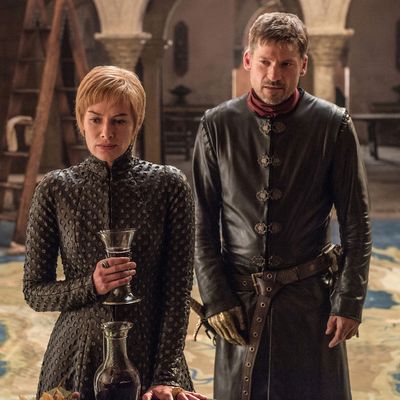
For a long time, Game of Thrones has been about the legacies that parents leave their children. Early seasons were dominated by family pressures in a generational, hierarchical way: The first season was about the hope that Ned Stark could fix things; then Catelyn’s subsequent rise, and her tricky power relationship with Rob; Jaime, Cersei, and Tyrion all battling for their father’s favor. It was intergenerational, too — Margaery and her relationship with her grandmother; Cersei and the laser focus on her children. After centuries of houses vying for control, Game of Thrones begins from the premise that children take the baton from their parents.
But it is no longer a game of parents and children competing to take control of the continent. Game of Thrones is now a much messier, and more complicated, story about siblings.
As you may have noticed, nearly all the parents are dead now. The Starks have been orphans for a while, and Tywin’s long shadow no longer looms over the map of Westeros. The parent and grandparent relationships have either been whittled away so that only one generation remains, or they’ve been obliterated completely. (Farewell, Randall and Dickon Tarly. Rest in peace, Margaery and Olenna Tyrell.) And so far, the next generation has declined to make strategic marriages and beget a new crop of chess pieces to move around the board. The entire thrust of Sansa’s early plot was to marry her off and get her pregnant, which obviously did not work out for her. Margaery Tyrell was boasting about how soon she’d give Tommen an heir; again, not so much. Cersei suggested an interesting new development in Sunday’s episode, but there are reasons to doubt her veracity. Dany’s Mother of Dragons status is the exception that proves the rule. They are her children, but no one’s looking to Drogon as the next body to sit on the Iron Throne.
Game of Thrones’ main players have all been systematically stripped of their parents and their children, and the show is now defined by the slippery, competitive, ill-defined, and ever-changing dynamics between brothers and sisters. Even one of the most fraught parental questions on the series — the issue of Jon Snow’s family tree — is now mostly a question of peers rather than heritage. We care about how this impacts his relationship with Dany; we don’t really care about what this means for what he’ll inherit.
It’s a show about political dynasties, and yet somehow there are no more marriage plots. There is no love story, and whatever hint there may be of one is a by-now-foregone Luke and Leia–esque situation. With the admittedly notable exception of Jaime and Cersei, the only relationships left are platonic, tenuous, easily undone relationships between peers.
The sibling dominance of Game of Thrones has changed the tenor of the series in an unexpected way. Without parental figures to anoint whichever child they select as the next house leaders, the primary characters are left to figure things out for themselves. There have been years of squabbling based on whose parents did what to which family, and whether or not to follow the suggestion your grandmother made. Those dynamics don’t work any more. Dany’s suggestion that Jon “bend the knee” because his family did long ago went over like a lead balloon, and Jon’s decision to keep the Umber and Karstark children in their family homes was a choice to ignore the sins of their parents. Tradition means little now; either make an alliance with your siblings, or choose to go it alone.
Game of Thrones’ slow winnowing down to a small set of peers has an important additional impact in the larger thematic arc of the show. The threat of the White Walkers has long loomed over the series, and if season seven has made nothing else clear, it’s that winter has finally arrived. That’s a statement about the threat of the dead army (and also about weather), but it’s reflected in what’s left of the show’s major families. A next generation of children is an investment in the hope that time will move forward, and that there will be a future for your children to inherit. Intentionally or no, characters in Game of Thrones have almost uniformly failed to invest in that future. It’s one of the most quiet and potent indications of exactly how terrible the White Walkers are — why have children when there may be no world for them to live in? And it’s worth noting that the one potential pregnancy on the series belongs to the woman who still doubts the army of the dead.
This is what makes the Game of Thrones’ sibling dominance so fascinating. They are alone now, with no parents and almost no children to tie them to a past or propel them into a future. All they have left is themselves, and whether or not they can learn to trust one another.





